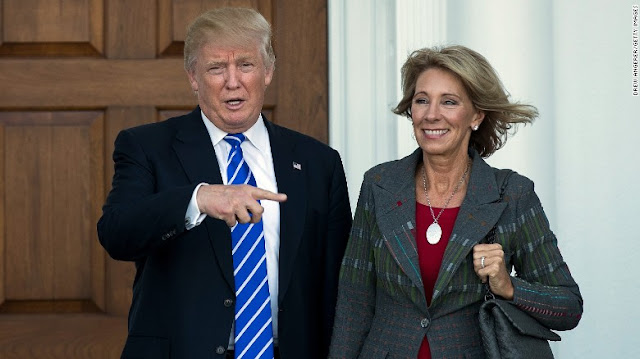What Does The Appointment of Betsy DeVos Mean For Public Schools?
Earlier this
month, President-Elect Donald Trump named Michigan's Betsy DeVos to be the next
secretary of education. DeVos, a strong advocate for school vouchers and school
choice in her home state, is expected to bring this topic to center stage when
she begins her term in Washington in the coming months.
Israel
Ortega of Forbes Magazine listed five
ways that DeVos could become a transformative leader. First, Ortega
suggests DeVos could reauthorize the Washington, D.C. Opportunity Scholarship
Program, a federally-funded voucher program to support low-income families by
providing them with private school options. Second, DeVos could redirect Federal
Title 1 dollars to follow low-income students, not schools, thus allowing
families to use these funds to cover tuition costs at private schools. Third,
Ortega suggests that DeVos could reform the network of schools for Native
American students by providing families with education savings accounts to pay
tuition at private schools. Fourth, DeVos could turn Washington, D.C. into an all-choice
city by providing families greater access to charter schools. Lastly, Ortega
suggests that DeVos could continue to be a champion of charter schools. Ortega
writes that DeVos could “promote the innovations in charters and invest in
research and development so the lessons we learn in our schools can be
replicated and scaled in traditional schools.”
It comes as
no surprise that with Trump’s selection, he is making a strong case for the
privatization of our nation’s schools, implying that a business-model approach
will improve our schools for all students. This is not a new concept. Nearly
two decades ago, ice cream executive turned education advocate Jamie Vollmer
tried unsuccessfully to duplicate his successful business model to schools. In
an Education
Week article back in 2002, Vollmer recounted his story of how he began a
talk with an auditorium of teachers by stating, “If I ran my business the way
you people operate your schools, I wouldn’t be in business very long!” He went
on to describe how he transformed a small ice cream company in the mid 1980’s
into one that had a highly successful product line of blueberry ice cream. His
undoing came at the end of his speech when a teacher asked him this simple
question: “When you are standing on your receiving dock and you see an inferior
shipment of blueberries arrive, what do you do?” Reluctantly, he responded with
“I send them back.” In that moment, he knew he was defeated, and the teacher
jumped right down his throat, stating, “That’s right! We can never send back
our blueberries. We take them big, small, rich, poor, gifted, exceptional,
abused, frightened, confident, homeless, rude, and brilliant. We take them with
ADHD, junior rheumatoid arthritis, and English as their second language. We
take them all! Every one! And that, Mr. Vollmer, is why it’s not a business.
It’s school!” From that point forward, Vollmer learned a valuable lesson. He
wrote, “For the most important thing I have learned is that schools reflect the
attitudes, beliefs and health of the communities they serve, and therefore, to
improve public education means more than changing our schools, it means
changing America.”
This past week,
NPR
reported on Chalkbeat’s Managing Editor Philissa Cramer thoughts on what
DeVos’s legacy as Secretary of Education may look like. Cramer started by
pointing out that Michigan’s charter schools are some of the least regulated in
the country, and went on to note that a huge proportion of schools there are
for-profit schools that do not work in the best interest of the students that
they serve. When asked about the potential for DeVos to divert Title 1 dollars
to school voucher programs, Cramer suggested that this would be a very large
change to how schools are funded, and it would require all states to chip in
financial support as well to keep such a program afloat. She stated, “Her
efforts have been successful in some places, less successful in others. So it
remains to be seen how they could actually make that happen.”
With DeVos
at the helm, the future of public education is uncertain, and the impact for
the changes that may follow will be felt not only by the students and their
families but also by teachers and teacher unions, the backbone of the
organizational structure in most of America’s schools today. Last week, Lily
Eskelsen Garcia, President of the nation’s largest teacher union the National
Education Association (NEA), had
this to say about the impending appointment of DeVos: “Every day, educators
use their voice to advocate for every student to reach his or her full
potential. We believe that the chance for the success of a child should not
depend on winning a charter lottery, being accepted by a private school, or
living in the right ZIP code. We have, and will continue, to fight for all
students to have a great public school in their community and the opportunity
to succeed no matter their backgrounds or circumstances.” It seems through
Garcia’s words that DeVos may face an uphill battle when she begins her term
next month.
This article was written originally for MultiBriefs Education.




Comments
Post a Comment